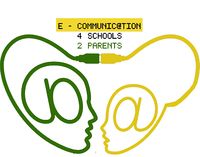ECom4s2p: Difference between revisions
No edit summary |
No edit summary |
||
| Line 15: | Line 15: | ||
The '''E-com4S2P Project''' was a Leonardo Da Vinci LLP Mobility funded by the European Union and coordinated by [[Katholieke Hogeschool Limburg dept SAW]](Limburg Catholic University College), Hasselt Belgium. The central idea was that communication between schools and families is essential for building trusting relationships that foster parental involvement. Parental involvement in schools and social institutes is necessary for youngsters to develop successfully and to make decisions that will have positive outcomes for their futures. | The '''E-com4S2P Project''' was a Leonardo Da Vinci LLP Mobility funded by the European Union and coordinated by [[Katholieke Hogeschool Limburg dept SAW]](Limburg Catholic University College), Hasselt Belgium. The central idea was that communication between schools and families is essential for building trusting relationships that foster parental involvement. Parental involvement in schools and social institutes is necessary for youngsters to develop successfully and to make decisions that will have positive outcomes for their futures. | ||
The [[New Media Lab]] of the [[Cyprus Neuroscience and Technology Institute]] was a partner. | |||
This study examined the role of new ICT communications technologies in fostering parental involvement in schools and social institutes and uncovers barriers that prevent usage of technology to promote communication. Little research has been done to evaluate the role of emerging technologies in enhancing communication practices between schools specialised in vocational training and parents/guardians. | This study examined the role of new ICT communications technologies in fostering parental involvement in schools and social institutes and uncovers barriers that prevent usage of technology to promote communication. Little research has been done to evaluate the role of emerging technologies in enhancing communication practices between schools specialised in vocational training and parents/guardians. | ||
| Line 26: | Line 28: | ||
* [[Elia Petridou]] | * [[Elia Petridou]] | ||
==Overall | ==Overall objective== | ||
The purpose of | The purpose of the study was to evaluate the role and possibilities of different interpersonal communications technologies like cell phone and e-mail, school websites, blog, electronic learning environments and new social websites like Facebook, Twitter, etc. in communicating with parents. Additionally, these communication modes will be appraised for their efficacy in facilitating parental involvement in schools. | ||
==Snapshots from the Cyprus meeting== | |||
==Links to Youtube video clips== | |||
[[Category:Future Worlds Center Projects]] | [[Category:Future Worlds Center Projects]] | ||
[[Category:NML Projects]] | [[Category:NML Projects]] | ||
Revision as of 01:23, 26 October 2014
|
The E-com4S2P Project was a Leonardo Da Vinci LLP Mobility funded by the European Union and coordinated by Katholieke Hogeschool Limburg dept SAW(Limburg Catholic University College), Hasselt Belgium. The central idea was that communication between schools and families is essential for building trusting relationships that foster parental involvement. Parental involvement in schools and social institutes is necessary for youngsters to develop successfully and to make decisions that will have positive outcomes for their futures.
The New Media Lab of the Cyprus Neuroscience and Technology Institute was a partner.
This study examined the role of new ICT communications technologies in fostering parental involvement in schools and social institutes and uncovers barriers that prevent usage of technology to promote communication. Little research has been done to evaluate the role of emerging technologies in enhancing communication practices between schools specialised in vocational training and parents/guardians.
The following individuals from the New Media Lab and others have participated and/or benefited from the project:
- Iliada Spyrou
- Andreas Drakos
- Mihalina Drakou
- Tatjana Taraszow
- Yiannis Laouris
- Elia Petridou
Overall objective
The purpose of the study was to evaluate the role and possibilities of different interpersonal communications technologies like cell phone and e-mail, school websites, blog, electronic learning environments and new social websites like Facebook, Twitter, etc. in communicating with parents. Additionally, these communication modes will be appraised for their efficacy in facilitating parental involvement in schools.
